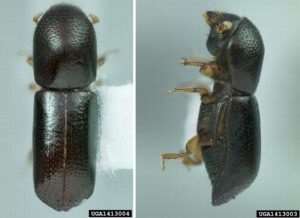Using some pleasant-smelling chemicals, avocado growers may soon be able to repel beetles that inject a potentially deadly fungus into their trees, saving fruit and money, University of Florida Institute of Food and Agricultural Sciences researchers say.

When they’re infected with the laurel wilt fungus, redbay trees – a close cousin to the avocado — emit methyl salicylate to repel redbay ambrosia beetles, the very beetles that gave the trees the fungus in the first place, scientists say in a newly published study.
Florida avocados bring a $100 million-a-year impact to Florida’s economy, UF/IFAS economists say. They grow almost entirely in southern Miami-Dade County, but growers have battled the laurel wilt fungus, which can kill redbay and avocado trees, since it arrived in Georgia in 2003.
Because avocado growers have few viable options to combat laurel wilt, UF/IFAS researchers looked for solutions. For the study, scientists compared the number of beetles captured on sticky traps disposed on redbay tree logs. After 10 weeks, they also looked at the holes dug by the beetles into the logs because that’s when the beetles transmit the fungus.
Scientists then tested three different blends of repellant and found verbenone and verbenone plus methyl salicylate — produced by the infected redbay tree — were the most efficient. When scientists applied these repellants on redbay logs, they reduced the number of beetles captured on sticky traps by 95 percent and the number for boring holes by 90 percent.
“We believe that these repellants could be used in a larger context, if associated with bug lures to have a push-pull system,” said Marc Hughes, a former postdoctoral researcher in the Forest Pathology Laboratory in UF/IFAS School of Forest Resources and Conservation. The repellants push the beetles away, while the lures – or “attractants,” as scientists call them – pull them toward traps, where they are killed. “Attractants would be placed outside the avocado groves, while avocado trees will be treated with repellant.”
In addition to the fact that the repellant — methyl salicylate — seems to work, it is about 80 percent less expensive than verbenone, Hughes said.
The repellant discovery comes as good news for avocado growers. Some fungicides are available, but they are expensive, said co-author Xavier Martini. Insecticides are not very efficient because beetles spend most of their time within the wood.
Source: ufl.edu